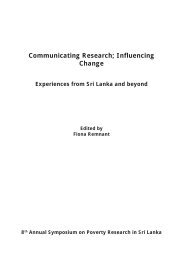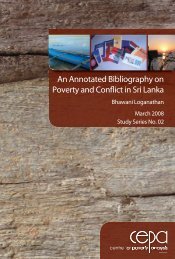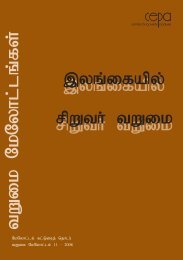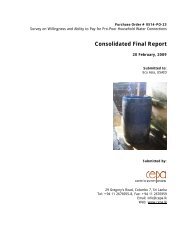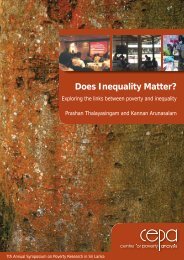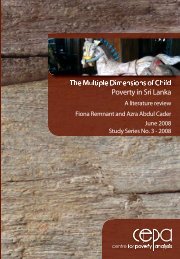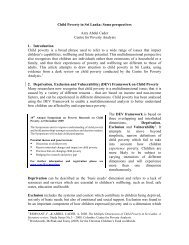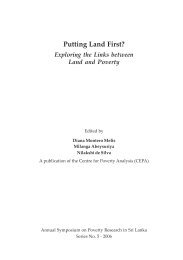Involuntary Displacement and Resettlement â Policy and ... - CEPA
Involuntary Displacement and Resettlement â Policy and ... - CEPA
Involuntary Displacement and Resettlement â Policy and ... - CEPA
- No tags were found...
You also want an ePaper? Increase the reach of your titles
YUMPU automatically turns print PDFs into web optimized ePapers that Google loves.
The data above does not show strong correlations between headship, l<strong>and</strong>tenure <strong>and</strong> compensation. Female heads holding a permit/grant seemed to havehad better ‘luck’ getting compensation compared to households with ahusb<strong>and</strong>/male head present. On the other, h<strong>and</strong>, under private l<strong>and</strong>ownership,households with a man present seemed to have had better ‘luck’ than theirsingle, female-headed counterparts.The complication with respect to joint families arises from the fact that whileevery family unit in that one house that was destroyed is in reality a ‘family’,legally they are not. After one nuclear family has received a house, it is asthough the remaining sub-families do not exist. The data in Table 4 showthat more female-headed sub-families households in this category obtainedcompensation than households with a man present. In the case of renters<strong>and</strong> joint family (again with the caveat of the small sample size <strong>and</strong> nobaseline data), it is unclear why female-heads seem to have had more‘success’, than families with an adult male present. Perhaps GNs took pity onthem or perceived them as vulnerable <strong>and</strong> deserving of help. However,compensation is about one’s legal entitlement <strong>and</strong> not about pity.Receiving compensation that is due should neither be a matter of ‘luck’ norleft to the whims of a local government official. What the data in Table 4does show is the misapplication of the Tsunami (Special Provisions) Act No.16 of 2005. Families renting at the time of the tsunami are not entitled to anew house, but a high percentage of renting families managed to obtainone, with female-headed households having more success than theircounterparts 15 . On the other h<strong>and</strong>, while squatters were regularised underthe Act (COHRE: 2006:5), the data above show regardless of headship, 60%of the families had not received compensation. Later in this section I discusswhat actions some of these families are taking to obtain what is due to themunder the law 16 .The reasons why many of the families in Table 4 remain in15In these cases the homeowner is entitled to assistance for the destroyed/damaged house.Tenants are not entitled to any housing compensation. Tenants <strong>and</strong> lessees are covered underSection 31- Tenant or lessees’ rights not to be terminated.16 In one instance, three fishing families from the Kalubowila site in Dehiwala were squatting atthe time of the tsunami. However, 12 years earlier they had been ‘relocated’ from this samelocation to Baduwita, where the government gave them a piece of l<strong>and</strong> <strong>and</strong> a small house. AsBaduwita is far from the sea <strong>and</strong> fishing is the only occupation they know, they sold that l<strong>and</strong><strong>and</strong> returned to Dehiwala. The DS <strong>and</strong> the GN told them that they are not entitled to anythingas they had previously received a house from the government.190



